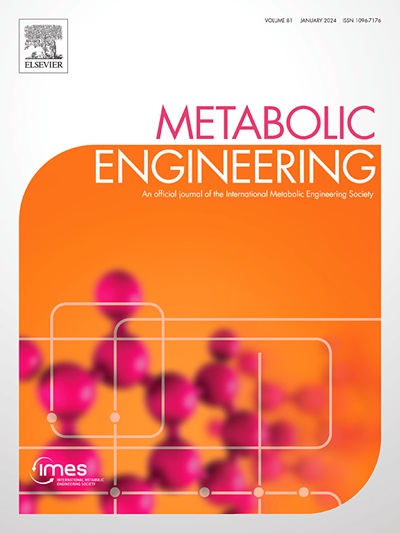Strategic engineering for overproduction of oviedomycin, a Type II polyketide, in Escherichia coli
IF 6.8
1区 生物学
Q1 BIOTECHNOLOGY & APPLIED MICROBIOLOGY
引用次数: 0
Abstract
This study aimed to develop a metabolically engineered Escherichia coli strain capable of producing oviedomycin, a type II angucyclinone polyketide compound with anticancer activity. We first addressed the challenges of in vivo reassembly of the type II polyketide synthase machinery in E. coli. These included co-expressing molecular chaperones, rare tRNAs, and a fusion tag to enhance the solubility of all proteins from the oviedomycin biosynthetic gene cluster in Streptomyces antibioticus. After the soluble expression of all the proteins was confirmed, oviedomycin production was improved by reducing the accumulation of the intermediate 3-dehydrorabelomycin through substrate channeling using the CipB scaffold protein from Photorhabdus luminescens. In addition, the AcrAB-TolC efflux transporter system was introduced to enhance the growth of the producing strain, leading to higher oviedomycin yields. Ultimately, fed-batch fermentation with the final strain produced 120 mg/L oviedomycin from glucose within 24 h. These strategies have marked significant progress in the construction of biosynthetic pathways for the heterologous production of type II polyketides in E. coli, offering promising potential for producing various natural products with industrial applications.

大肠杆菌中II型聚酮维多霉素过量生产的策略工程。
本研究旨在开发一种代谢工程的大肠杆菌菌株,该菌株能够产生具有抗癌活性的II型氨环素聚酮化合物卵霉素。我们首先解决了II型聚酮合酶机制在大肠杆菌体内重组的挑战。这些包括共表达的分子伴侣、罕见的trna和一个融合标签,以增强抗生素链霉菌中所有来自卵霉素生物合成基因簇的蛋白质的溶解度。在证实所有蛋白的可溶性表达后,利用光habdus luminesens的CipB支架蛋白通过底物通道减少中间3-脱氢贝洛霉素的积累,从而提高了卵绿霉素的产量。此外,acrabb - tolc外排转运体系统被引入,以促进生产菌株的生长,导致更高的卵多霉素产量。最终,最终菌株的补料分批发酵在24小时内从葡萄糖中产生了120 mg/L的维多霉素。这些策略标志着大肠杆菌异源生产II型聚酮生物合成途径的构建取得了重大进展,为生产具有工业应用的各种天然产物提供了广阔的潜力。
本文章由计算机程序翻译,如有差异,请以英文原文为准。
求助全文
约1分钟内获得全文
求助全文
来源期刊

Metabolic engineering
工程技术-生物工程与应用微生物
CiteScore
15.60
自引率
6.00%
发文量
140
审稿时长
44 days
期刊介绍:
Metabolic Engineering (MBE) is a journal that focuses on publishing original research papers on the directed modulation of metabolic pathways for metabolite overproduction or the enhancement of cellular properties. It welcomes papers that describe the engineering of native pathways and the synthesis of heterologous pathways to convert microorganisms into microbial cell factories. The journal covers experimental, computational, and modeling approaches for understanding metabolic pathways and manipulating them through genetic, media, or environmental means. Effective exploration of metabolic pathways necessitates the use of molecular biology and biochemistry methods, as well as engineering techniques for modeling and data analysis. MBE serves as a platform for interdisciplinary research in fields such as biochemistry, molecular biology, applied microbiology, cellular physiology, cellular nutrition in health and disease, and biochemical engineering. The journal publishes various types of papers, including original research papers and review papers. It is indexed and abstracted in databases such as Scopus, Embase, EMBiology, Current Contents - Life Sciences and Clinical Medicine, Science Citation Index, PubMed/Medline, CAS and Biotechnology Citation Index.
 求助内容:
求助内容: 应助结果提醒方式:
应助结果提醒方式:


